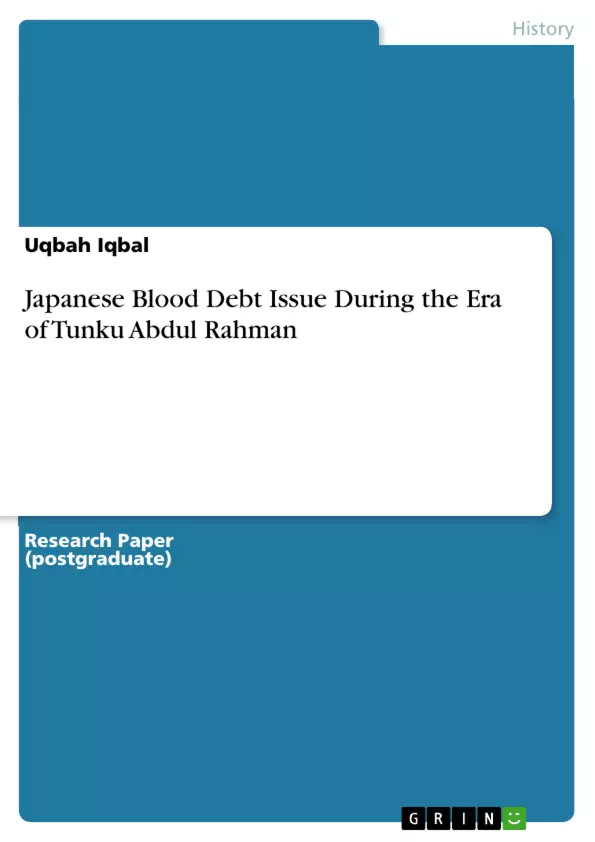Behind the country’s Pro-Western policy due to the Cold War era, diplomatic relations was established between the Federation of Malaya with Japan that has economic motives in order to reduce dependence on British. It became clear to the country's leadership that the war compensation issues will affect the common economic interests of both parties. British also saw Japan approach to the region is inevitable and decided not to stop it by the year 1954. American capital, Japan technical skills and Southeast Asia resources must be connected to fight Communism. The methodology used is based on the research methods of the resources available in libraries and the National Archives of Malaysia.
Inhaltsverzeichnis (Table of Contents)
- ABSTRACT
- INTRODUCTION
- JAPANESE BLOOD DEBT ISSUE
Zielsetzung und Themenschwerpunkte (Objectives and Key Themes)
This work examines the intricate relationship between Japan and Malaysia during the Tunku Abdul Rahman era, particularly focusing on the unresolved issue of war reparations, known as "blood debt." The author delves into the political and economic context of the time, highlighting the influence of the Cold War and the emerging global order on the relationship between these two nations.
- The impact of the Cold War on Malaysia's foreign policy
- The complexities of war reparations and the "blood debt" issue
- The economic motivations behind Japan's engagement in Southeast Asia
- The role of the British in shaping relations between Japan and Malaysia
- The significance of economic development in both countries and its influence on the relationship
Zusammenfassung der Kapitel (Chapter Summaries)
- ABSTRACT: This section provides a brief overview of the paper's focus, highlighting the intertwined economic and diplomatic factors influencing relations between Japan and Malaysia, particularly the issue of war reparations.
- INTRODUCTION: This section introduces Tunku Abdul Rahman, the first Prime Minister of Malaysia, and his pro-Western foreign policy stance, shaped by the Cold War environment and his appreciation for British support in Malaysia's development. It highlights his commitment to reconciliation and his perception of the British as a reliable partner.
- JAPANESE BLOOD DEBT ISSUE: This section explores Japan's foreign policy in Southeast Asia after World War II, particularly its focus on economic development, driven by the Yoshida Doctrine. It highlights the British understanding of Japan's strategic importance to the region and the economic interdependence that developed between the two countries. It further outlines the formation of the South-East Asia Development Fund (SEADF), a Japanese initiative aimed at securing Southeast Asia for the Western camp, and its reception by the British.
Schlüsselwörter (Keywords)
The main keywords and focus topics of this work include blood debt, Japan, Malaysia, Tunku Abdul Rahman, war reparations, Cold War, economic development, Yoshida Doctrine, South-East Asia Development Fund (SEADF), and pro-Western foreign policy.
Frequently Asked Questions
What is the "Japanese Blood Debt" issue?
It refers to the unresolved issue of war reparations and compensation from Japan to Malaysia for the suffering caused during World War II.
How did the Cold War influence Malaysia's foreign policy?
Under Tunku Abdul Rahman, Malaysia adopted a pro-Western stance to fight Communism, which led to establishing economic ties with Japan to reduce dependence on the British.
What was the role of Tunku Abdul Rahman in Japan-Malaysia relations?
As the first Prime Minister, he sought reconciliation with Japan while maintaining a pro-Western policy, recognizing the economic necessity of Japanese engagement.
What was the South-East Asia Development Fund (SEADF)?
The SEADF was a Japanese initiative aimed at securing Southeast Asia for the Western camp through economic development and regional investment.
What methodology was used for this research?
The research is based on resources from libraries and the National Archives of Malaysia, focusing on political and economic historical contexts.
- Citar trabajo
- Uqbah Iqbal (Autor), 2015, Japanese Blood Debt Issue During the Era of Tunku Abdul Rahman, Múnich, GRIN Verlag, https://www.grin.com/document/298969



